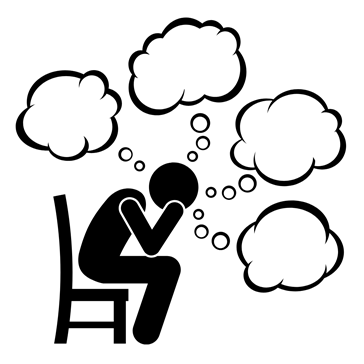February may be the shortest month of the year, but it can often feel like the longest because of it being in the middle of the winter with cold, dreary days and the end of school still far in the distance. Due to COVID-19 and winter, are you finding yourself feeling…
Anxious?
Stressed?
Overwhelmed?
If you are experiencing these emotions, you are not alone. Every teen experiences anxiety at different points in their high school experience. Sweaty hands, a racing heart, or ‘butterflies’ in the stomach can be common symptoms when a person feels stressed or anxious. However for some teens, anxiety can interfere with everyday life and relationships.
The pandemic has caused many young people to feel isolated and struggling to work through their feelings of anxiousness. The way you feel when you are stressed is the brain trying to protect the body from perceived danger. The brain is very complex, but in basic terms, there are three parts:
The Survival Brain: This part of your brain responsible for keeping you alive. It controls heart rate, breathing, body temperature, sleeping/waking, and movement.
The Emotional Brain: This part of your brain is responsible for regulating your emotions.
The Smart Brain: This part of your brain controls higher functioning and deep thinking, such as communication processing (reading, writing, talking and listening), problem solving, and critical thinking.
When our brain thinks we are in danger, it responds to help us stay safe. This is called our fight/flight/freeze response. This was especially useful a long time ago, when hunters faced danger from wild animals and had to choose whether to fight, run, or hide. In that moment of intense stress, your survival brain takes over to raise your heart rate, breathing, and body temperature. It can also increase your ability to run quickly. The emotional part of your brain makes your feelings more intense, such as ANGER to act as a warning system. Your “thinking brain” temporarily goes offline, making it more difficult to talk and solve problems….because it really doesn’t matter if you can find the answer to algebra problems if you are being chased by a bear! The good thing is after you are safe, the brain returns to normal.
These days it’s rare for us to find ourselves in true “danger” situations, but our brains are still stressed. Modern day stress can range from school work, expectations of parents, conflict with people we care about, change, doing something new, bullying, or fear of the unknown. What makes stress today more difficult is that it does not go away quickly, but instead can be long-lasting. Chronic stress causes the Survival Brain to go into overactive protective mode, producing chronic anxiety and worry.
Anxiety is very energy intensive. It’s like running on ‘high alert’ all the time. Let’s look at 3 ways to bring calmness into our lives.
1) Calm your body
Calming your body helps to calm your mind. By controlling your heart rate and movement, you can encourage your brain to relax. Exercise is important to use up extra energy and improve health. Aim for at least 30 minutes a day, 3x a week.
Lastly get enough sleep. Your Smart Brain doesn’t work as well when you are tired, meaning you are more likely to make risky or emotional decisions. People also tend to feel more anxious at night because the Emotional Brain is more active causing heightened emotions.
2) Calm your mind
Focusing your thoughts can help break the worry cycle. Think about something positive in your life. We all have something to be thankful for. Be aware of the influences in your life…friends, social media, t.v., music, etc…what we put into our mind affects what we think about.
“Friends, I’d say you’ll do best by filling your minds and meditating on things true, noble, reputable, authentic, compelling, gracious—the best, not the worst; the beautiful, not the ugly; things to praise, not things to curse….Do that, and God, who makes everything work together, will work you into his most excellent harmonies.”
Philippians 4:8
3) Turn your Smart Brain back on
Re-engage your smart brain. Once you have calmed your body and mind, you must also turn your “thinking brain” back on. This part of your brain allows you to reflect on situations thoughtfully. To help manage stress through your Smart Brain:
-Talk to someone you trust
-Journal (write your thoughts down)
-Research or read
-Learn something new
If you are feeling more stressed than usual or anxious thoughts are interfering with your daily life, talk with your homestay family or AHLI Coordinator to get extra help. We understand these are not easy times, and we want you to be healthy in all areas.
Take a moment to watch this video from a recent AHLI graduate. She shares how she balanced the stress of high school during the pandemic.
Sincerely,
Tiffanee M. Wright, MA, MPH | Executive Director
AHLI – International Education and Homestay


